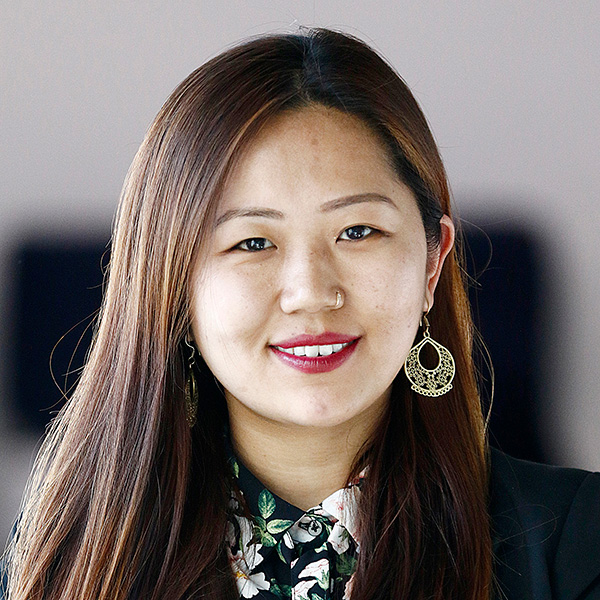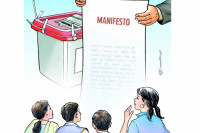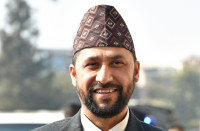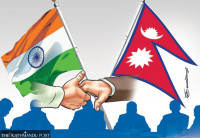National
Itahari mayor misbehaves with a journalist and deputy mayor issues apology
The instance may look like simple bureaucracy, but female politicians say it shows how women are denied decision-making role and made to play second fiddle
Bhrikuti Rai
A video of Itahari Mayor Dwarikalal Choudhary chastising a journalist and calling him biased during an interview was shared widely on social media last week. The Federation of Nepali Journalists also issued a statement condemning Mayor Choudhary’s behaviour. After the video surfaced on the internet, Deputy Mayor Laxmi Gautam had to step in to clean the mess created by the mayor. She issued an apology letter for the mayor’s unbecoming behaviour.
Gautam told the Post she had to issue the apology because the mayor wasn’t in town after his now infamous episode with local journalists.
The apology didn’t garner as much attention as the video did.
But Gautam’s contemporaries—deputy mayors almost all of them women—who were watching the events unfold said they felt a sense of deja vu seeing a female deputy jump into damage control mode to defend the reputation of her senior male colleague.
The only other time they made headlines was when women deputies were forced to fight or raise their voice to exercise authority, during decision-making processes or as coordinators of judicial committees in local bodies.
“It’s like the men remember us only when troubleshooting is required for the problems that we did not create,” said Rita Kumari Mishra, deputy mayor of Janakpurdham. “How come they don’t remember us during decision making and planning processes?”
Mishra is among the hundreds of women elected in local governments in the 2017 elections.
Women now make up 40.96 percent of the 35,041 elected representatives, a visibly high representation than in the past. However, a significant chunk of leadership positions was claimed by men since parties chose to field women like Mishra only for deputy positions to comply with the Election Commission’s rules, which required 40 percent of total nominees to be women and chief and deputy chief nominations in each local unit be gender-even.
As a result, parties fielded mostly all men for the posts of chiefs, who now lead 98 percent of the local bodies, according to the Election Commission. And not a single woman leads any of the states, as chief minister.
Unlike a lot of elected female representatives, Mishra says she has been able to exercise her authority to some extent, but watching so many of her contemporaries struggle to do the same is heartbreaking.
“We are here by the people’s mandate and yet we face hurdles when it comes to working for the people as per our rights enshrined by the constitution,” Mishra said.
There have been several media reports and studies by NGOs about the limited roles and authority of elected female representative in towns and ward levels, as well as their struggle to rightfully exercise their power.
The most recent case of outright dismissal of an elected female deputy mayor’s voice and authority was when a monitoring report of road construction prepared by Renu Jha, deputy mayor of Hansapur Municipality in Province 2, was disregarded by Mayor Ramgyan Mandal.
“I am sick and tired of fighting just to do my job with dignity,” Jha told the Post in a phone interview.
Even the people from her community refuse to accept her authority as the deputy mayor, let alone her male subordinates and senior at work, she said.
“Sometimes I regret winning the election.”
Senior female politicians say the conundrum faced by elected female representatives, who refuse to accept powerful men’s whims, is symptomatic of deeply rooted patriarchal values in Nepali politics.
“Women’s political representation has increased but unless patriarchal belief, which refuses to accept women as leaders, changes, these gains will not last,” said lawmaker Binda Pandey of the ruling Nepal Communist Party. “And the same belief was what led to the skewed representation in leading positions in party nominations too,” Pandey told the Post.
Pandey, who is among a handful of vocal female politicians, said the state as well as political parties, who fielded women, many of whom have never held public office in the past, failed to play their role to provide orientation to both their male and female party members about exercising and respecting the authority of elected representatives.
“Powerful men’s refusal to acknowledge women’s roles in ushering in change in politics and society, and nominating them for the sake of complying with the laws has made it further difficult for elected women in local bodies,” Pandey said.




 13.12°C Kathmandu
13.12°C Kathmandu















